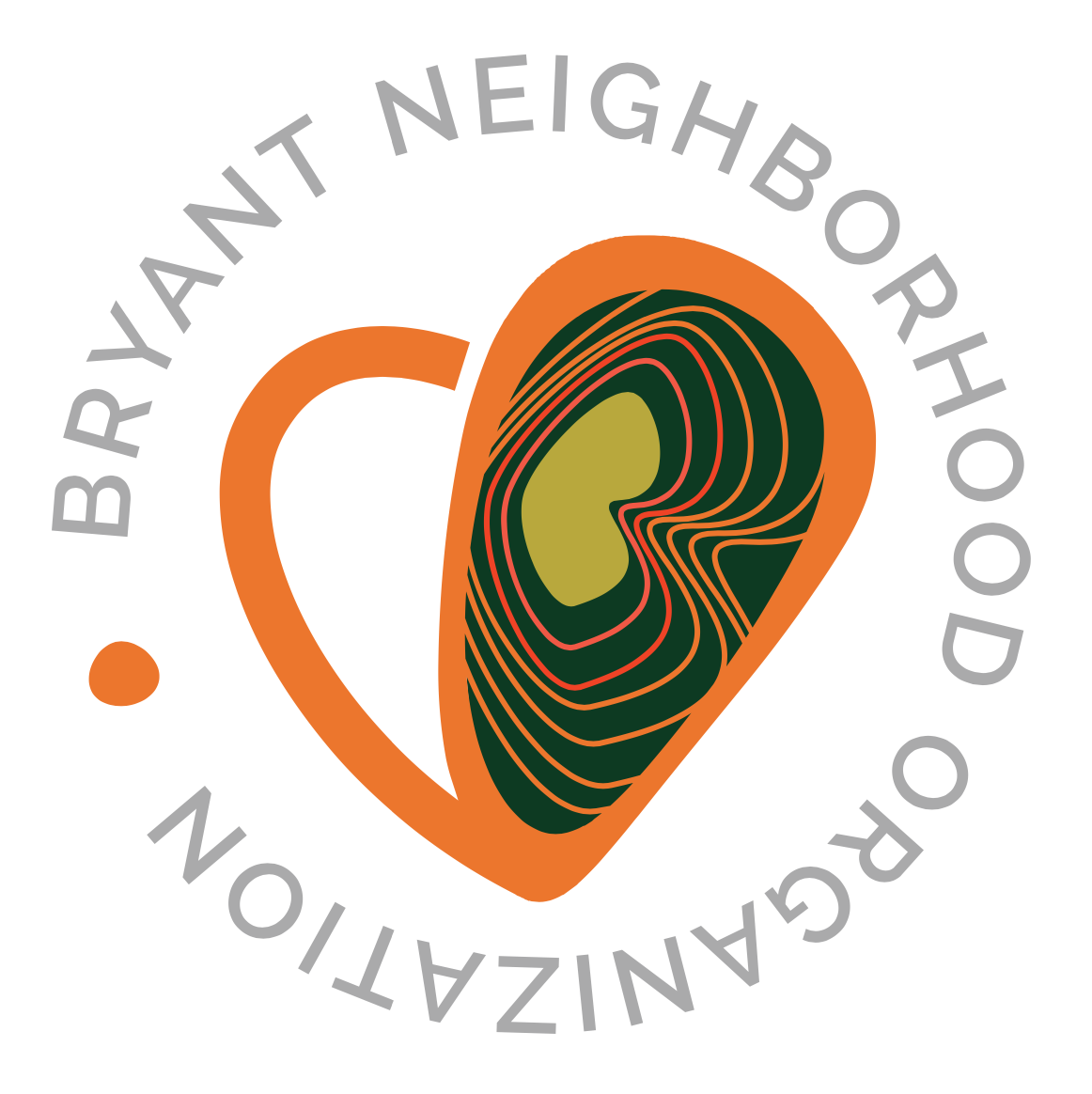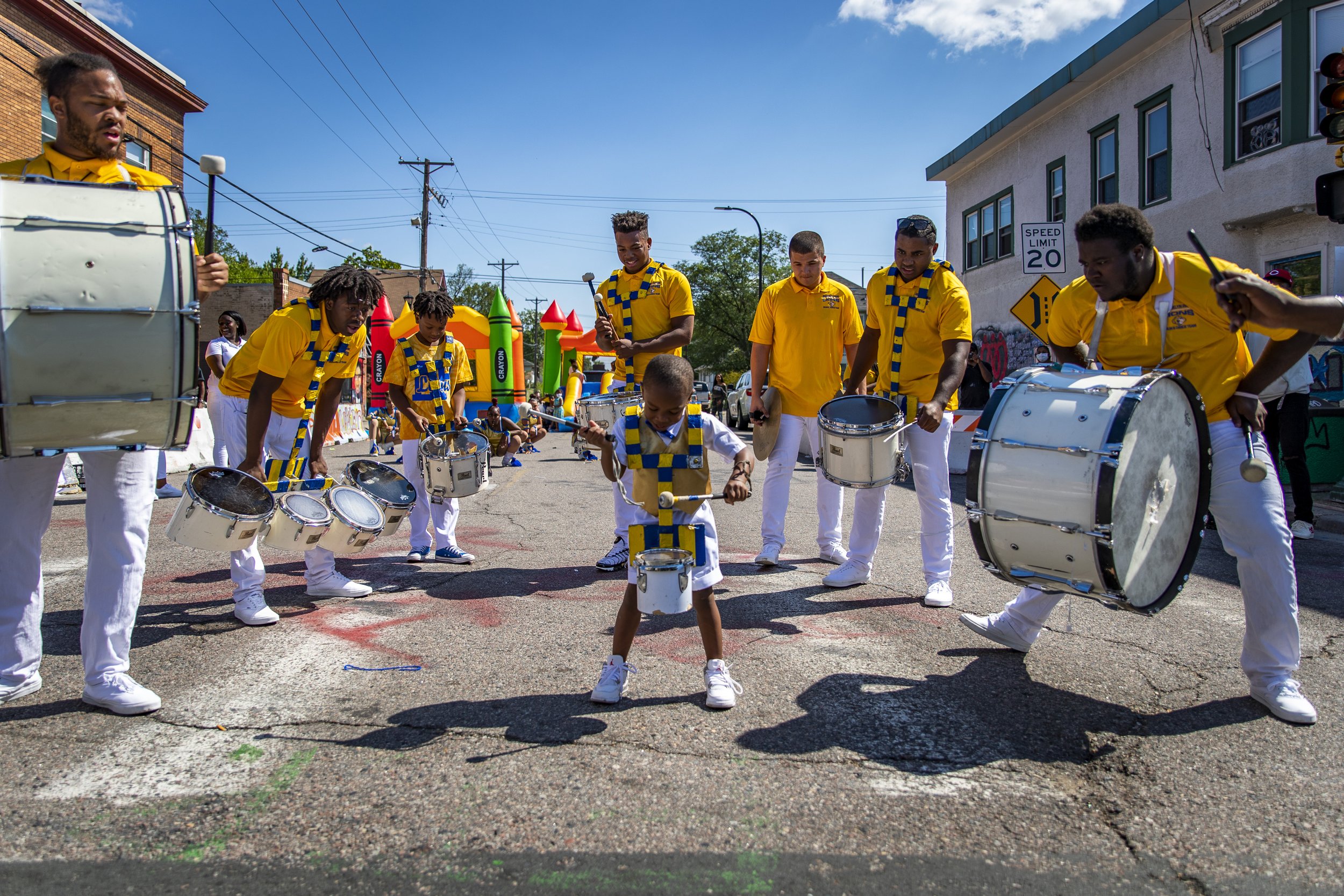
Mission & Values
We are Bryant Neighborhood Organization
We activate neighbors and leaders to build relationships across identities to mobilize collective power through:
Antiracist Organizing
Food Liberation
Environmental Justice
We organize community to build a landscape that heals, not harms, by eliminating systemic oppression.
Community Values Statement
In 2017, in partnership with the surrounding 35W corridor neighborhoods of Central, Lyndale and Kingfield, we did extensive outreach to our residents and listened to the issues that impact them in their day-to-day lives. From this work, our neighborhoods collectively adopted a shared value statement for what we want our communities to look like.
Our neighborhoods along the 35W corridor have a long history of racial and economic disparities that can be traced back generations. The construction of the freeway literally and figuratively created a barrier through our neighborhoods that has contributed to disparate economic opportunities, uneven property values and redevelopment opportunities, differing access to public education, displacement of African Americans and their homes, racially concentrated areas of poverty in our immigrant communities, and policies and practices that have stood in the way of building one community that reaches its fullest potential.
Over the last few years, we have seen increased economic development in all our neighborhoods. While our neighborhoods welcome economic development that creates opportunities for all our residents, without a holistic approach and response from neighborhoods these developments can lead to: gentrification, further displacement of people of lower income (largely people of color), and further increase in the racial inequities between our communities and neighborhoods.
We believe that neighborhood organizations can, and need to, play a role in helping identify and address disparities that stand in the way of our neighborhoods all being compelling places to live, work, play and invest. We understand and appreciate that these values may manifest themselves differently in each neighborhood and while we know that these common themes make us stronger, we also celebrate the diversity in individual neighborhood priorities.
Acknowledging systemic racial and economic disparities is integral to building a unified community.
It is complicated to untangle the role that overt and systemic racism has had in creating disparities in our communities, particularly since many of these policies, practices, and attitudes have been in place since before the formation of our city. These actions look like: biased lending practices and policing, building freeways in historically black neighborhoods, and disparate education and employment opportunities; Minneapolis is a tale of two cities for whites and people of color. The first steps in repairing the damage done to communities of color in our city is to acknowledge and understand that it has happened. We support initiatives that prioritize communities of color when looking at implementation of education policies, economic policies, and access to employment and home ownership.
Access to safe, affordable, long-term housing is a basic human right.
Too many of our residents cannot find dignified places to live. We see landlords increasing rents beyond what residents can pay to afford to live in their homes, seniors on fixed income pushed out of their homes by rising property values, and families living on the street because they can’t find affordable housing. We are seeing more and more situations where members of our communities are losing access to dignified places to live. We support policies and programs that halt displacement of communities of color, increase pathways to home ownership, help older adults stay in their homes, as well as increasing affordable rental stock and long term affordable housing opportunities integrated into all neighborhoods. As neighborhood organizations we must recognize that a shortage in the supply of housing contributes to increased housing costs and displacement, and so support increasing the housing supply in our neighborhoods to secure abundant housing for all.
Everyone in our city should have the freedom to be safe from violence, harassment, and crime.
Safety means different things to different people. For some in our community, there is a fear of violence from the police who are sworn to protect us. For others, it means the safety of being in a sanctuary city. For some it is protecting what is ours, our personal property and a sense of safety when walking on the streets or riding our bikes on the road. And still for others, it means safety from gang, drug or sexual violence. We support responsible community driven efforts to increase safety, as well as efforts to increase accountability for those sworn to protect us.
Neighborhoods where new infrastructure, housing and commercial developments are being built should have a voice in determining the types of collective benefits the community enjoys from a specific development.
When developments go up and new businesses come in, there can be multiple benefits to the community when neighborhood voices are brought into the fold. Community involvement is important to give a more personal perspective on anticipated changes, and to relate actual accounts of evolving consequences. We support programs and agreements that encourage working with new developers and businesses to ensure that jobs and other opportunities are available to current neighbors. We support initiatives that consider neighborhood concerns around traffic management, including those resulting from increased visitation in our neighborhoods.
Access to affordable, healthy food, as well as common household necessities, make our neighborhoods more inclusive and accessible to people from all walks of life.
After years of living in a food desert, fresh, healthy food has finally come to our neighborhoods but often at premium prices and with limited availability to middle and low-income residents. Our neighborhoods are also threatened by the possibility of losing your only large home goods retailer in the area. Our neighborhoods support initiatives that create access to fresh, healthy and affordable food as well as preserve/encourage the existence of affordable retail and grocers while employing neighbors.
A successful community invests in its people, not just its infrastructure.
Communities, and the people in them, have the greatest chance to live to their fullest potential when others believe and invest in them. Our neighborhoods support initiatives that create unhindered and equal access to quality public schools, positive after school opportunities, quality learning and social experiences for young and old alike, employment readiness training, and equitable investments in green and recreational spaces across our neighborhoods.
We found that the diversity of issues that our neighbors are concerned with are as diverse as the neighbors that make up our community. Neighborhood organization staff and our project team of volunteers compiled this feedback through a series of conversations have come to the belief that all of the issues facing our neighborhood have roots in racial and economic disparities. Sometimes the connection between an issue and these disparities are undeniably clear.
As non-profit neighborhoods associations, neither Bryant, Central, Kingfield, nor Lyndale will endorse any candidate for any elected office. It is our hope that all candidates vying for our community’s votes will make concrete commitments to supporting our platform, and work with our communities to close these racial and economic gaps once elected.

